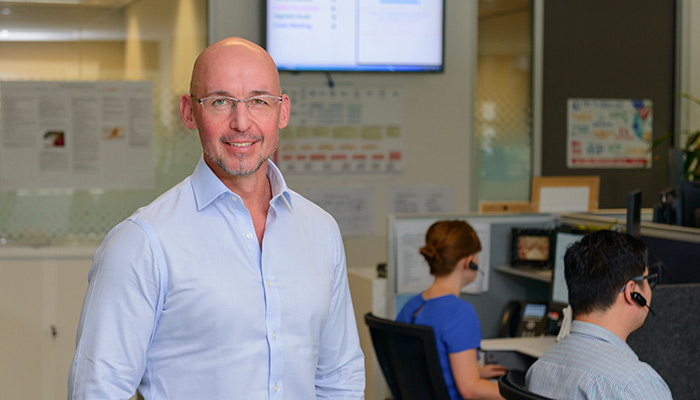Leigh had never spoken to a doctor about her experiences with anxiety and depression, until she went to the MindSpot Clinic, where an online quiz confirmed her own suspicions about her mental health.
“Before that, just the thought of doing something like face-to-face counselling loomed like a huge mountain that I could never attempt to climb,” she says.
Leigh, who is in her mid-40s, works as an adviser in a non-profit organisation and says that while she’s always felt supported by her close-knit circle of family and friends, things are better for her since she went to MindSpot.

Practical support: MindSpot Director Professor Nick Titov, says many clients have never sought therapy before contacting them.
She has learned ways to address feelings and worries that have troubled her since her teenage years.
“I would get so worried about things that I couldn’t sleep at all, then if I didn’t do something on time I would have all these negative thoughts, and tell myself I was useless and stupid.”
Leigh’s job involves a lot of travel and staff management, and she says that sometimes she felt she was only just holding things together.
“Through MindSpot, I learned strategies around how to problem-solve, how to work through issues and ways to deal with things that would have seemed really unmanageable before,” she says.
Since her initial treatment with MindSpot, Leigh has been able to talk about her anxiety to her GP.
“For so long I thought it was too hard to address my mental health, but actually it was much harder living with it,” she says. “Life is easier now.”
MindSpot Clinic
Leigh is one of more than 20,000 people around Australia who have done an assessment and then gone on to access treatment through MindSpot’s online clinic since it began five years ago.
Patients who access treatment from Macquarie’s revolutionary digital mental health portal don’t pay anything, as the service is fully funded by the Australian government’s Department of Health.
“MindSpot prioritises services and interventions that can help the largest number of people,” says Professor Nick Titov, Director of MindSpot and co-Director of Macquarie’s eCentreClinic.
“Many of the people who use our service haven't had treatment before, and many report that they're not going to seek treatment elsewhere, for a range of reasons, including stigma and concerns about privacy.”
He says it’s not unusual for people who have experienced mental health problems since their teen years – like Leigh – to wait a long time before seeking help.
And despite a perception that young people are the main adopters of online solutions, the average age of MindSpot clients is around 36 years – which mirrors the average age of clients who see a psychologist or a psychiatrist face-to-face.
“That’s a concern because we know the average age of onset of symptoms of anxiety and depression is in late childhood or early adulthood, so it seems people still wait for at least a decade before they seek support or treatment,” says Titov.
Titov is a clinical psychologist who led the development of the innovative service and now heads up a team of more than 50 people who provide assessment and treatment for adults with anxiety, depression and chronic pain.
Titov says, “People often think about going to the psychologist or psychiatrist as a deeply emotional and traumatic experience, which invariably involves recounting your deepest, darkest fears."
But the MindSpot team have taken the approach of finding ways to help people who have anxiety and depression to manage their symptoms, without dwelling on the past.
“These symptoms are obviously incredibly distressing and disabling, but we know people can learn to manage them, and we teach people practical skills that they can use to deal with them.”
![]()
Managing emotions: Professor Titov says MindSpot teaches people practical skills they can use to deal with them without dwelling on the past.
Convenience a drawcard
Titov says that the online tools are available any time and therapists available till 8pm most nights - and the convenience and accessibility of the online services is a big drawcard.
Internet-delivered services can also complement therapies offered face-to-face, he says.
“Some of the people we work with have such severe symptoms that they aren't able to see a professional face-to-face,” he explains.
People with severe anxiety or social phobia can find it overwhelming to leave their home. “Working with us can help them build enough confidence and skills to then be able to see somebody face-to-face for further support and treatment.”
MindSpot is a great example of stepped care. “People can use our service and then step up to more intensive face-to-face treatment; but they can also step down to our service – so, after an in-patient admission, or after working with their therapist or psychiatrist face-to-face, we can provide them with some additional support afterwards,” Titov says.
Many people come to MindSpot for assessment and information rather than treatment.
“We support people to learn practical psychological skills that can help them manage their own symptoms in the long term,” he says.
Getting an assessment and information gives people agency, and the service also helps people make informed decisions about what they can do next.
“Some people go on to treatment with us, others decide to manage their symptoms themselves, while we help others learn about and then access other services.”
In comparison, face-to-face appointments with a psychologist or a psychiatrist generally only happen after a GP referral, and the process often takes a few weeks to arrange because GPs and mental health professionals often have substantial waiting lists.
**Data in this article was updated on 30 March, 2020.
Professor Nick Titov is Director, Department of Psychology and Macquarie University's online mental health portal Mindspot Clinic.
